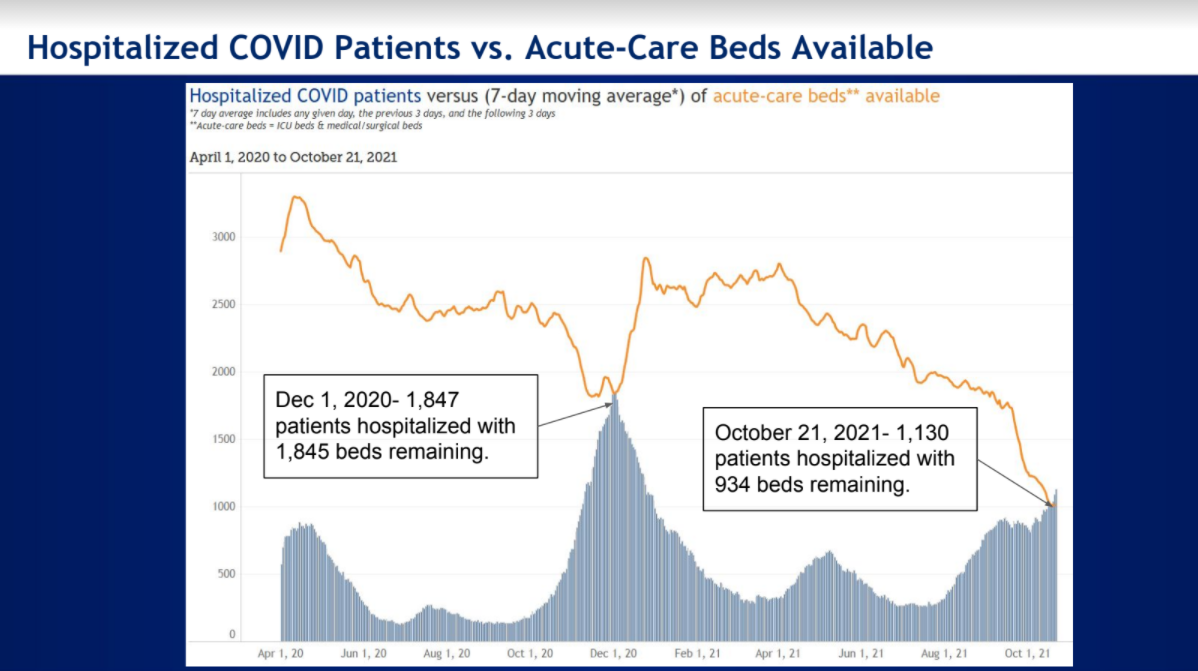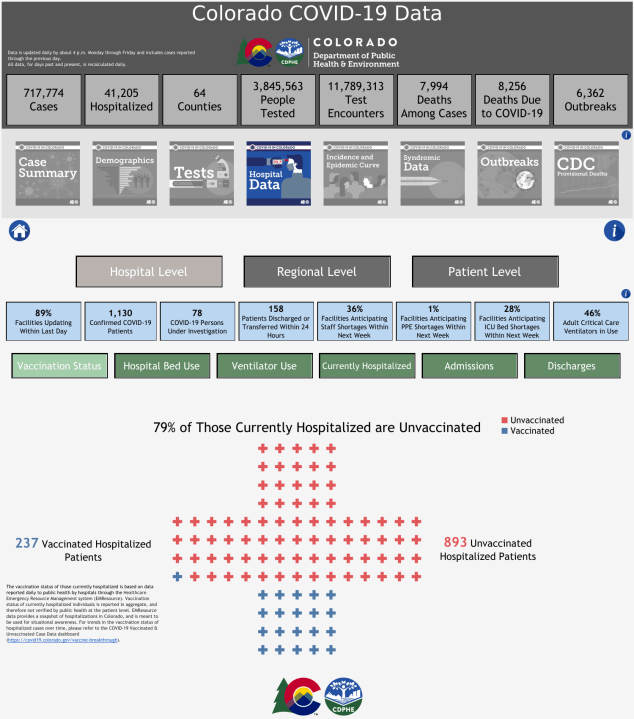DENVER (KDVR) — The largest surge of COVID-19 hospitalizations in Colorado this year coincides with a low point for hospital bed stock across the state, and it’s a massive concern for public health and hospital officials.
As of Thursday, state data showed there were 1,201 people hospitalized with COVID-19, the highest level since Christmas of last year, as Colorado was descending from it’s highest COVID hospitalization spike.
But even when we saw the most Coloradans in the hospital for COVID-19 on Dec. 2, 2020 with 1,995 patients, we still had a far larger bed margin than now. Back then the number of available beds was 1,845, now it’s only 934.

“Surgeries are being canceled. Brain surgeries, heart surgeries are being delayed because of a lack of availability to provide care to those patients because of the impact COVID hospitalizations are going to have,” said Colorado Department of Public Health and Environment Incident Commander Scott Bookman in a briefing with the governor Thursday.
During a time when we need as many beds as possible, and ICU capacity is 90% or higher across Colorado, how did we get to this point?
Turns out, there are several factors contributing to this shortage.
Hospitalizations for non-COVID reasons
As Coloradans have tried to return to normal, hospitals have seen more people come through their doors for the same reasons they would before the pandemic.
“We are seeing much more respiratory virus early this season,” said Cara Welch with the Colorado Hospital Association. “Through the summer we had our trauma season that keeps our hospitals incredibly busy.”
While people stayed indoors for a good chunk of 2020 trying to avoid the virus, they may have put off needed health care visits, out of caution to not contract it.
“We’re also seeing, unfortunately, a lot of people present at our hospitals who may not have sought the preventative care or the regular care at our hospitals they would have received earlier in the pandemic, and now they’re coming to the hospital in a much more acute condition and needing more intensive hospital care,” Welch said.
One and a half years into the pandemic, resources at hospitals remain strained across the state and the country.
“It’s not just about the space available in the hospital, but it’s also about our supplies, so like the PPE which was a challenge early on, and it’s also about our staff,” Welch said.
Staffing is a top concern for hospitals
“We’ve seen national estimates that as many as one in five in health care has left over the course of the pandemic,” Welch said.
Whether it’s burnout from the job, changing a career path or resistance to mandates, staffing shortages aren’t exclusive to Colorado. Welch said that while vaccine mandates are blamed for these shortages when discussed in public and in the media, she doesn’t believe it’s a major factor in these shortages.
“We do know the mandate has been challenging in some of our communities, however, our vaccination uptake in our health care organizations and specifically in our hospitals has been incredibly high,” Welch said.
The CDPHE collects data on how many health care professionals have quit or been fired over vaccine mandates. While it does not have the full data currently available, facilities have reported that 1.35% of staff at licensed facilities have left due to vaccine requirements, according to a spokesperson.
UCHealth, the largest health care provider in the state, fired 119 employees for not getting the COVID-19 vaccine, which only accounts for 0.5% of its more than 26,000 employees.
Another staffing challenge: health care workers leaving Colorado for higher-paying jobs in the field based on demand.
“We see some of our health care workers that chose to leave maybe a staffed position here to go work for a staffing agency or a travelers nurses agency where they can get a pretty large bonus and go work in other states where they’re able to offer a lot of money for a staff to come in.”
COVID-19 hospitalizations
While the state is seeing the highest level of COVID-19 hospitalizations this year, that still isn’t making up a majority of patients in Colorado’s ICUs.
“From what we hear from our hospitals, it’s anywhere from 20% to 40% of total patient population,” Welch said. “It’s not the majority of the pie but it’s a big enough slice of the pie that if we bring those numbers down it would help us out tremendously.”
Still, a vast majority of Coloradans in the hospital with COVID-19 are unvaccinated, at a rate of 79%. Gov. Polis said in Thursday’s address that the median age of the vaccinated breakthrough cases in the hospital is much higher, indicating those populations are more at-risk and prone to the virus.

“So much of this right now is not COVID, but if we could bring our COVID numbers down and that would help us out a lot,” Welch said. “We’re also heading into flu season and there are just a lot of other things going right now that are leading to that uncertainty in our hospitals.”
Welch recommends everyone who hasn’t been vaccinated to get their shot, and for the rest of Coloradans to get their boosters and flu shots to help with an overwhelmed system.
What hospitals are doing
There are a number of things hospitals can do to try and free up resources to increase capacity or total beds, but the balancing act puts a major strain on the system.
“Our hospitals are pulling all of those levers at the moment,” Welch said. “Some of that may be canceling scheduled procedures, we know that some of our systems have been doing that for weeks now.”
Welch said hospitals have been transferring patients based on demand. Rural hospitals have been sending some to the Denver metro to help with more severe cases, and Denver hospitals have been sending patients to rural hospitals who are in the final stages of care to free up space.
Another tactic hospitals are using is called “diversion,” instructing EMS services and ambulances to bring patients to the next closest hospital to manage capacity.
